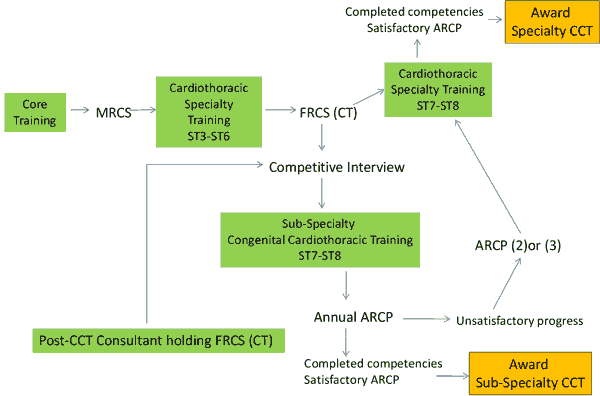Sub-specialty
Overview of Sub-Specialty training in Congenital Cardiac Surgery
Cardiothoracic training begins at ST3 level, having completed two years of Core Surgical training and obtained the MRCS examination (or equivalent). Trainees then enter generic cardiothoracic training programmes at the intermediate I and then intermediate II levels, covering all aspects of the curriculum in the generality of cardiothoracic surgery.
Trainees are eligible to sit the Intercollegiate Specialty Examination in Cardiothoracic Surgery FRCS(CT) during the ST6 year and above if they have achieved the necessary competencies as defined by the curriculum. The examination is in the generality of the specialty and trainees are expected to demonstrate a level of knowledge equivalent to that of a day 1 consultant.
The final two years of Cardiothoracic training (ST7-8) are designed to allow trainees to develop areas of special interest. Trainees wishing to pursue a career in congenital cardiac surgery will undertake a two-year sub-specialty training programme. Entry will be by competitive interview and candidates will need to have passed the Intercollegiate Specialty Examination FRCS(CT) to be eligible.
The curriculum in congenital cardiac surgery covers all aspects of neonatal, infant and paediatric cardiac surgery as well as surgery for adult congenital heart disease. The syllabus covers all emergency and elective conditions as well as transplantation, mechanical circulatory support and hybrid technology. In addition, the syllabus covers a general understanding of specific medical, physiological, technical and legal aspects of working with children.
The curriculum also allows for a degree of flexibity to accommodate technological advances and the changing needs of our patients.

Introduction
Although there are many areas of 'special interest' within the field of cardiothoracic surgery, Congenital Cardiac Surgery is the first to exist as a Sub-Specialty in its own right. This demands a dedicated two-year syllabus that covers all aspects of paediatric and adult congenital cardiac surgery. Successful completion would lead to the award of CCT in Cardiothoracic Surgery and in the Sub-Specialty of Congenital Cardiac Surgery.
The main areas covered in the syllabus are:
- Anatomy & Physiology of Congenital Heart Disease
- Patient Assessment & Decision Making
- Professional and Legal issues of working with children and families
- Neonatal Cardiac Surgery
- Infant & Paediatric Cardiac Surgery
- Transplantation & Mechanical Support
- Adult Congenital Heart Surgery
- Tracheal Surgery
The Training Pathway in the Sub- Specialty of Congenital Cardiothoracic Surgery
Entry into the sub-specialty will be by competitive interview at the level of ST7 and dependent on the attainment of the part III exam in the generality of cardiothoracic surgery. Training is also available to post-CCT holders in cardiothoracic surgery who wish to obtain sub-specialist training.
The standards and the delivery of training are overseen by the Specialist Advisory Committee (SAC) in Cardiothoracic Surgery. The SAC has a consultant member nominated by the trainees (the Cardiothoracic Dean) who is responsible for direct contact with trainees and who is available to deal with problems or questions trainees may have.
The objective of the training programme is to produce trained congenital cardiothoracic surgeons, who will have the clinical knowledge, the surgical expertise and the professional skills necessary for consultant practice in paediatric and adult congenital cardiac surgery.
The syllabus, therefore, defines the requirements of the training programme in congenital cardiothoracic surgery. It identifies distinct topics within the specialty and defines the requirements or competences within each of these areas, at each stage of training.
Within each module, the levels of competence are further defined in the following domains:
- Knowledge: e.g. basic scientific knowledge; clinical knowledge
- Clinical skills: e.g. history, examination, data interpretation, patient management
- Technical skills and procedures: e.g. technical procedures, operative management
- Professional behaviour and leadership skills: transferable or generic, professional skills, expected of all surgeons
The curriculum also identifies the tools that will be used to assess competence and monitor progress. Cardiothoracic training is now to be seen as competence based rather than, as in the past, determined solely by the number of years in training or by the numbers of procedures performed.
Upon successful completion of the programme the Cardiothoracic Trainee will be able to demonstrate competence in all aspects of the management (including operative management) of Congenital Cardiac Surgery.
The Configuration and Delivery of Congenital Cardiothoracic Surgical Services
Congenital Cardiothoracic surgery is concentrated into large regional or teaching hospitals, where there is easy access to all medical and support facilities. There will usually be somewhere between 4 and 5 consultant surgeons in each unit, each unit performing approximately 400 open heart operations each year.
Training programmes will consist of two linked centres that, together, cover the compete syllabus and provide joint assessment of trainees at ARCP.
Programmes that do not provide exposure to highly specialised areas such as transplantation and tracheal surgery will incorporate a dedicated module in which the trainee is accommodated in one of the two national centres (GOSH and Freeman Hospital, Newcastle).
Programmes will be assessed and accredited by the SAC. The ARCP process will be attended by trainers from both of the contributing institutions as well as by the SAC liaison member for that programme and an external congenital surgeon approved by the SAC.